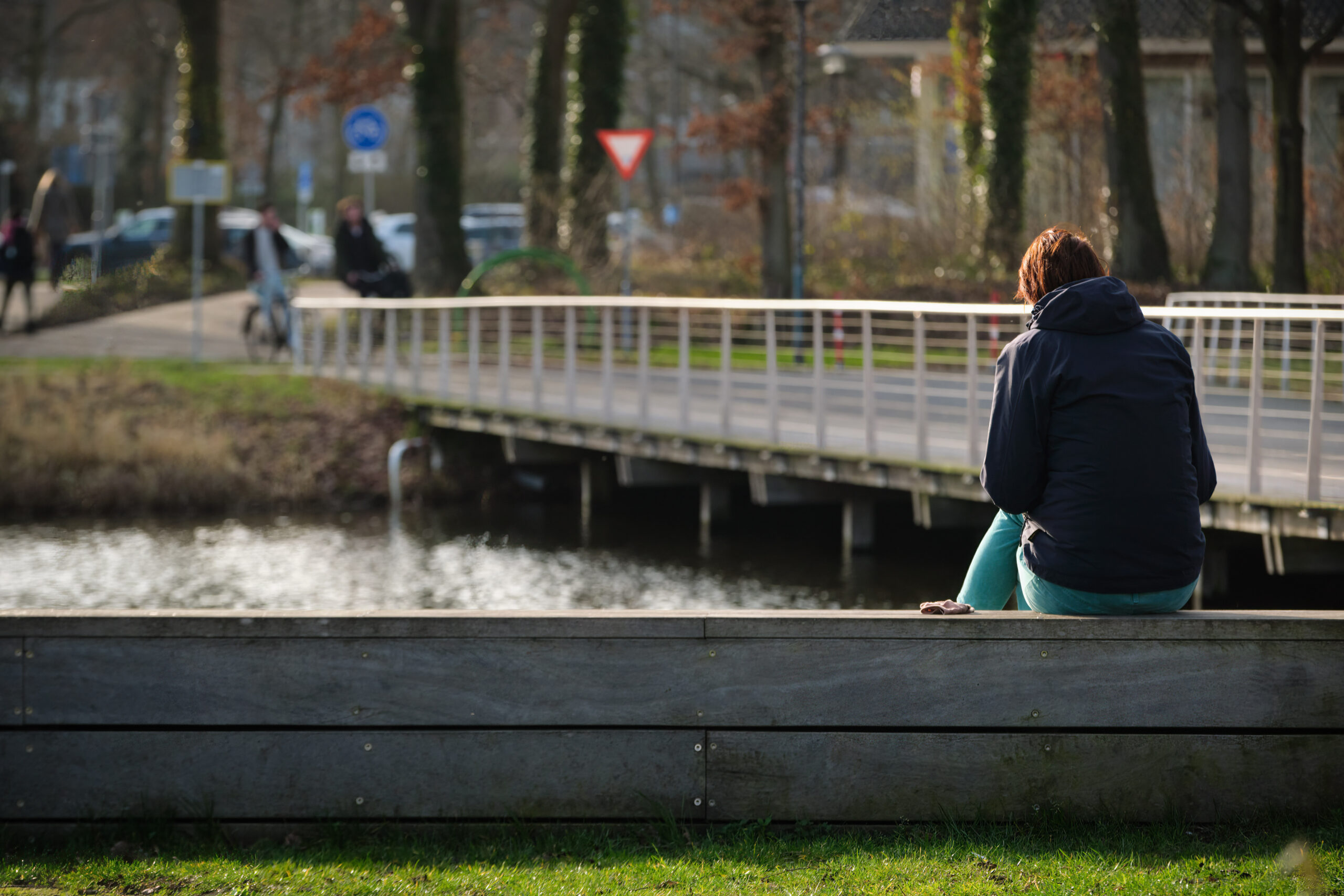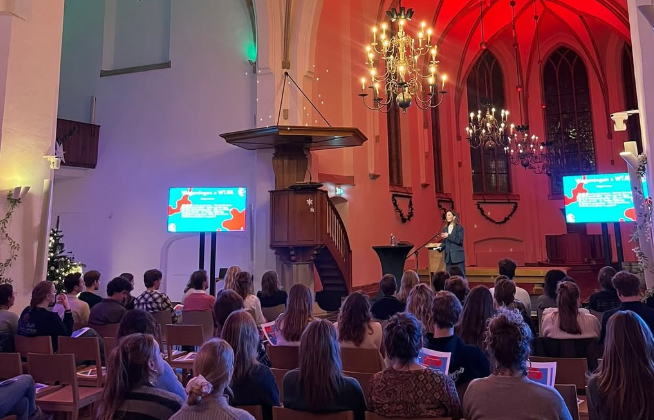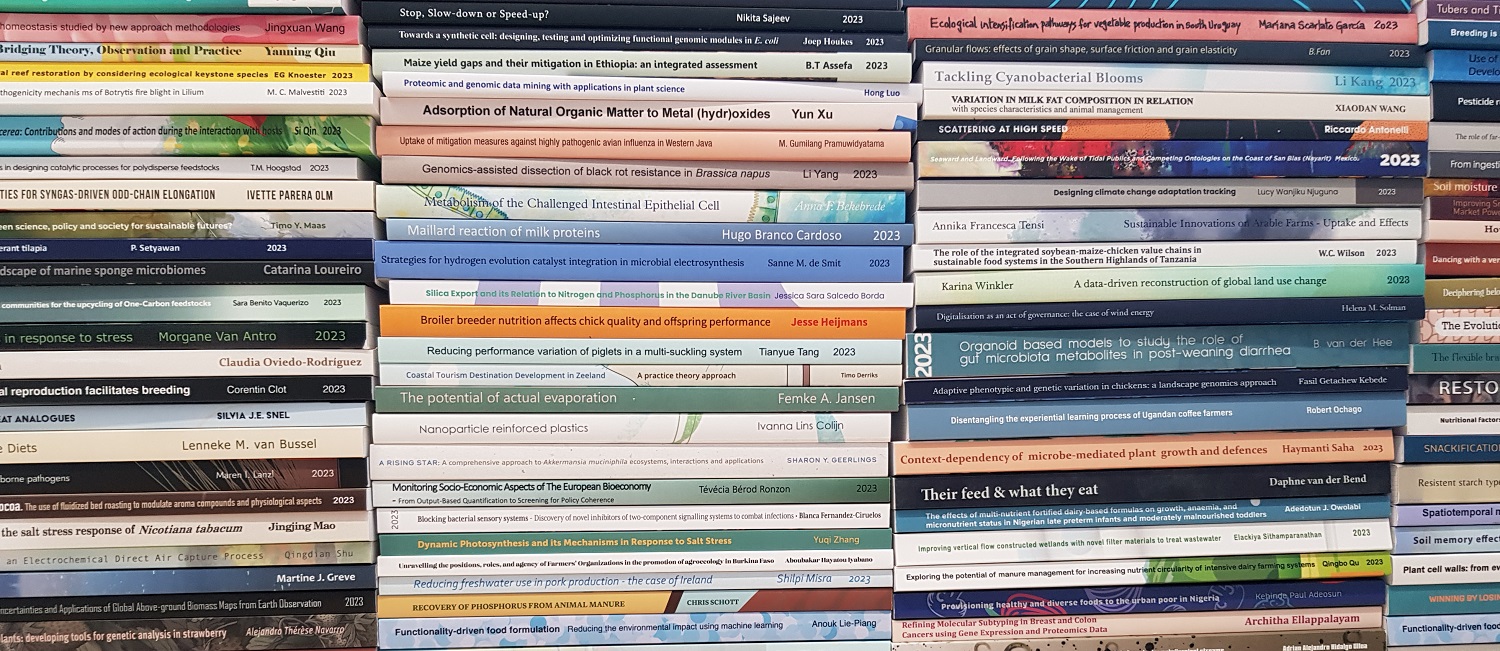Now that the campus is opening up for education again, it is time to take stock of the damage. What impact has two years of Covid crisis had on students, teachers and the education? ‘What we’ve missed most is the contact.’
Since mid-January students have once again been able to enjoy education on campus, but in the first few weeks it was still fairly quiet in the educational buildings. Not all teachers wanted to switch from online to campus education in the middle of period 3. Too inconvenient. Some students even dreaded going to the campus, says policy officer Jetske ten Caat. ‘They don’t know their fellow students and feel there’s a barrier, as though they were going on their own to a party or conference where they didn’t know anyone.’
Ellis Hoffland, personal professor of Soil Biology and a member of the Board of Education, did decide, in consultation with her students, to teach on campus again. About two-thirds of her students wanted to come to campus – ‘they were tired of sitting at home’. And Hoffland rediscovered the great advantages of the lecture hall: ‘interaction, looking each other in the eye, asking questions’.
Relief
Bettina Bock, personal professor of Inclusive Rural Development and another member of the Board of Education, is relieved that the coronavirus measures have been relaxed again. After two years of teaching in Covid times, she notices exhaustion among teachers and students. ‘Much of the teaching has continued and the learning objectives have been met, according to an initial evaluation. But students miss contact, discussion, critical reflection and gaining experience outside the university.’
New first-years hardly know anyone from their degree programmes
In addition, the Board of Education estimates that some students have fallen behind, as a result of which fewer students will graduate this year. Bock also expects to see students who postponed their thesis research because of Covid catching up now.
All in all, Covid has caused a lot of uncertainty around education for nearly two years now, according to Vera Hartman and Judith Kikkert. Like Bock, these two students are actively involved in the Board of Education. Kikkert: ‘Not knowing where you stand: that’s been the recurring theme for both teachers and students over the past two years.’ Teachers have responded very flexibly, in her view. ‘As soon as campus education is allowed, almost all the teachers are prepared to offer it again. At the same time, they try to offer hybrid options for students in quarantine. These changes create a lot of extra work . It’s obvious that everyone is Covid-weary. A lot has been achieved under high pressure, but that also costs a lot of energy.’
Hartman adds: ‘It’s been a difficult time for students. Online education is very anonymous and “straight to the point”. You don’t get to know teachers and fellow students very well. There is more to being a student than just attending lectures and doing practicals.
One student had made a fortune with crypto currencies
It is about developing into a discerning human being. It is precisely in the margins of your education that you learn that, for example in the committees and through the dynamics of group work on campus. On the other hand, the switch to online has also taught us many new skills. For example, we have become much more flexible and new forms of education are emerging. That side of the story deserves a mention now and then too.’
Contact
A major problem in recent years has been the limited contact between teachers and students, as well as among students themselves. Teachers struggle with this, Hartman says. ‘Wageningen is known for its small groups and plenty of personal contact. The quality of the education here depends on that too. Teachers want to reach their students, but how do you do that online? They have to try and detect whether students are keeping up with the material from the reactions of the few who actively participate in the online lectures.’
A number of teachers suspect that some of their students have dropped out. Sometimes these suspicions are confirmed by stories they hear. International Land and Water Management teacher Alex Bolding received an email from a student who had disappeared from the radar for 18 months. ‘He had quit and made a fortune with crypto currencies, and now he wanted to continue his studies.’ Bolding has also heard stories about lads who dropped out during the lockdowns and threw themselves into gaming. According to Bolding, students are longing for on-campus education. That is allowed again now, but meanwhile 30 of her 65 students taking a course taught by a colleague have tested positive. ‘So then you have to go back online.’

time.’
Alone in a room
The first Covid year was doable, according to Bolding. ‘At first, we went into crisis mode, quickly designing online courses, learning a lot and trying to make the best of it. But at some point you run out of gas. After one year, I was exhausted and had no enthusiasm left.
I see the most stress among teachers with young children
I noticed the same thing among students: there was a drop in participation online. Understandably. The degree course had sounded great, with a trip abroad or an internship every year, but they haven’t had any of that for the past two years.’
Bolding is worried about the damage to mental health caused by the pandemic. ‘We now have first-years who only know each other from the Teams icon. That leads to loneliness if you are isolating and you don’t live in a friendly student house.’ He is concerned about PhD students and teachers too. ‘In my group there are eight new PhD students, but I don’t know them. They are in the office a lot, but we weren’t there anymore. That makes for loneliness. As for the teachers, I see the most stress among those with young children. My children have left home, so I can work undisturbed at home. Young parents have a hard time anyway because of the broken nights and the work of parenting. But when they both have to work from home and look after their children at the same time, it’s really tough.’
No one seriously behind
In general, Wageningen students have not fallen seriously behind in their studies during the Covid crisis. This is apparent from figures provided by the Education & Student Affairs department. The number of Bachelor’s students graduating within three years (the nominal duration of the degree programme) did drop slightly over the past two years (by three and four per cent) for the two cohorts affected by the Covid crisis. This is not very different from the figures for Bachelor’s students who did not study during Covid, however. There was a bigger drop in the number of Master’s students graduating in the nominal two years: this fell by seven per cent and four per cent in the two affected cohorts. ‘Master’s students mainly suffered delays affecting their internship and/or their final thesis research, due to the Covid restrictions,’ says data analyst Geertje Braat. ‘But after the third year, the number of Master’s students graduating successfully is back to normal.’ The dropout rate did not increase significantly in recent years either.
Absent
The Student Council is concerned about the wellbeing of students too. Chair Daphne Louws points to a Trimbos study that shows that 51 per cent of all Dutch university students suffered from mental health problems last year. ‘Unless Covid really mutates dangerously again, we never want to go back to fully online education’.
Sterre Hoek van Dijke is in the Education Enhancement working group on behalf of the student council. According to her, a large number of students have reached their Covid expiry date. ‘They are at the end of their tether. New first-years hardly know anyone from their degree programmes. More of them are lonely and isolated. And the fun sides of being a student, like going out with friends, were kind of illegal for a long time.’ So the opening up of the campus and everything else is very welcome. ‘If you go to the campus for classes, you enter the campus bubble too. As you go up the escalator, you see posters advertising activities, or you pop into your student association’s office and pick up a flyer. That feels a lot more natural than yet another online pub quiz.’
According to Hoek van Dijke, studying during the lockdowns was especially difficult for the less disciplined students. ‘I think students with a lot of self-discipline may have got better grades and passed more courses than usual, because there were fewer distractions, and they could plan things themselves. But if you are not good at planning, it’s just very difficult. No one is forcing you to go to those online lectures or checking whether you are paying attention. And if your camera is off, you can follow lectures in bed in your pyjamas. Nobody notices.’
Phases
For Kasia Groenenberg, a student of International Development Studies, there were different phases in her studies over the past two years. ‘At the beginning of the Covid crisis I was very strict and didn’t visit anyone except my girlfriend, housemates and family. As a result, I didn’t have enough social contacts.
A lot was achieved under high pressure, but it cost a lot of energy
At times, I was completely fed up with it: I was at home all the time on my laptop, I wasn’t feeling good about myself – I’d had enough. In the second period of last academic year, I dropped out for three months. I started going for lots of walks then and enjoying the outdoors. Now I’m more relaxed about the Covid rules and I feel a lot better.’
At the beginning of this academic year, Groenenberg went to Florence to do a minor, but there she could only take online classes. ‘So I came back to Wageningen early to take classes on campus here.’ She is not sure exactly how far behind she is with her studies.
Groenenberg thinks the university should approach all students to ask how they are doing. ‘I have a very active study advisor, but there are also students who don’t hear from their study advisor.’
Suggestions are being made that the university should organize extra classes, discussions and activities in the coming period to get the students involved again. But beware, says Bettina Bock of the Board of Education, that such efforts are not made at the expense of the already overburdened and exhausted teachers and admin staff.
Increased need for help
Increasing numbers of students are asking the university for help, says student welfare manager Door van der Sloot. In total, about 1200 students applied for help last year – over 200 more than the year before. ‘I think this increase can partly be explained by a kind of despair,’ says Van der Sloot. ‘We are now in the third lockdown. Students experience motivational and concentration problems, tension, stress and symptoms of depression, ranging from low mood to more serious complaints.’ ‘We started screening applicants to prevent the waiting lists for student psychologists from getting too long,’ Van der Sloot continues. ‘What kind of problems are they dealing with and what is the best solution? That could be seeing a psychotherapist, but for less severe cases, it could be an e-health module at Gezondeboel, a training course at Student Training & Support or a session with one of our life coaches, with whom you can have up to three sessions in which to unburden yourself.’
For more information on available help, visit www.wur.nl/nl/artikel/Hulp-van-Wageningen-University-Research.htm

 Some students even dreaded going to the campus
Some students even dreaded going to the campus 

